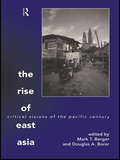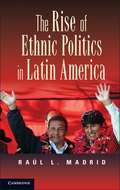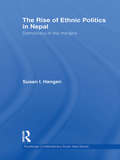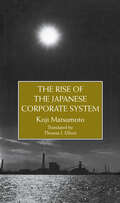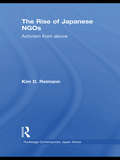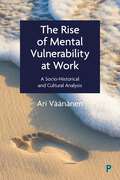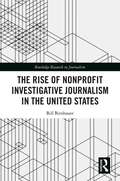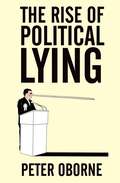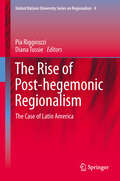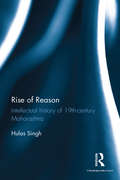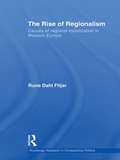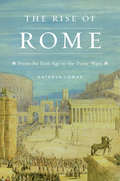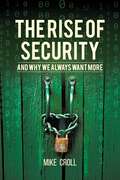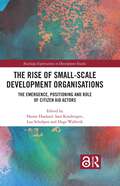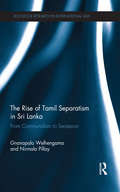- Table View
- List View
The Rise of East Asia: Critical Visions of the Pacific Century
by Mark T. Berger Douglas A. BorerThere is great interest in the Pacific Century and what its implications for the future will be. The rapid economic growth of East Asia was already setting the region apart from the rest of the world by the 1970s. By the 1980s the trend was seen to have spread southward to Thailand, Malaysia and Indonesia, while China's provinces had also become integral to the regional economic boom.In this exciting new study many of the ideas and expectations associated with the Pacific Century are placed under critical scrutiny. The book includes studies of particular countries such as China, Japan, South Korea, Vietnam, Indonesia and Malaysia. There is analysis of economic and political trends in the region, the reasons behind its rise and its importance on a global scale. The rise of East Asia represents an historic turning point with immense significance world-wide. This book will be of interest to anyone concerned about the new approaches to and the debate about the rise of east Asia and the coming of the Pacific Century.
The Rise Of Enlightened Sexism: How Pop Culture Took Us From Girl Power To Girls Gone Wild
by Susan J. DouglasWomen today are inundated with conflicting messages from the mass media: they must either be strong leaders in complete command or sex kittens obsessed with finding and pleasing a man. In The Rise Of Enlightened Sexism, Susan J. Douglas, one of America's most entertaining and insightful cultural critics, takes readers on a spirited journey through the television programs, popular songs, movies, and news coverage of recent years, telling a story that is nothing less than the cultural biography of a new generation of American women. Revisiting cultural touchstones from Buffy the Vampire Slayer to Survivor to Desperate Housewives, Douglas uses wit and wisdom to expose these images of women as mere fantasies of female power, assuring women and girls that the battle for equality has been won, so there's nothing wrong with resurrecting sexist stereotypes—all in good fun, of course. She shows that these portrayals not only distract us from the real-world challenges facing women today but also drive a wedge between baby-boom women and their "millennial" daughters. In seeking to bridge this generation gap, Douglas makes the case for casting aside these retrograde messages, showing us how to decode the mixed messages that restrict the ambitions of women of all ages. And what makes The Rise Of Enlightened Sexism such a pleasure to read is Douglas's unique voice, as she blends humor with insight and offers an empathetic and sisterly guide to the images so many American women love and hate with equal measure.
The Rise of Enlightened Sexism: How Pop Culture Took Us from Girl Power to Girls Gone Wild
by Susan J. DouglasWomen today are inundated with conflicting messages from the mass media: they must either be strong leaders in complete command or sex kittens obsessed with finding and pleasing a man. In The Rise Of Enlightened Sexism, Susan J. Douglas, one of America's most entertaining and insightful cultural critics, takes readers on a spirited journey through the television programs, popular songs, movies, and news coverage of recent years, telling a story that is nothing less than the cultural biography of a new generation of American women.Revisiting cultural touchstones from Buffy the Vampire Slayer to Survivor to Desperate Housewives, Douglas uses wit and wisdom to expose these images of women as mere fantasies of female power, assuring women and girls that the battle for equality has been won, so there's nothing wrong with resurrecting sexist stereotypes—all in good fun, of course. She shows that these portrayals not only distract us from the real-world challenges facing women today but also drive a wedge between baby-boom women and their "millennial" daughters.In seeking to bridge this generation gap, Douglas makes the case for casting aside these retrograde messages, showing us how to decode the mixed messages that restrict the ambitions of women of all ages. And what makes The Rise Of Enlightened Sexism such a pleasure to read is Douglas's unique voice, as she blends humor with insight and offers an empathetic and sisterly guide to the images so many American women love and hate with equal measure.
The Rise of Ethnic Politics in Latin America
by Raúl L. MadridThe Rise of Ethnic Politics in Latin America explores why indigenous movements have recently won elections for the first time in the history of the region. Raúl L. Madrid argues that some indigenous parties have won by using inclusive populist appeals to reach out to whites and mestizos. Indigenous parties have managed to win support across ethnic lines because the long history of racial mixing in Latin America blurred ethnic boundaries and reduced ethnic polarization. The appeals of the indigenous parties have especially resonated in the Andean countries because of widespread disenchantment with the region's traditional parties. The book contains up-to-date qualitative and quantitative analyses of parties in seven countries, including detailed case studies of Bolivia, Ecuador, and Peru.
The Rise of Ethnic Politics in Nepal: Democracy in the Margins (Routledge Contemporary South Asia Series)
by Susan I. HangenThe relationship between ethnic politics and democracy presents a paradox for scholars and policy makers: ethnic politics frequently emerge in new democracies, and yet are often presumed to threaten these new democracies. As ethnic politics is becoming increasingly central to Nepali politics, this book argues it has the potential to strengthen rather than destabilize democracy. Drawing on years of ethnographic fieldwork, Susan Hangen focuses on the ethnic political party Mongol National Organization (MNO), which consists of multiple ethnic groups and has been mobilizing support in rural east Nepal. By investigating the party’s discourse and its struggles to gain support and operate within a village government, the book provides a window onto the processes of democratization in rural Nepal in the 1990s. This work presents a more nuanced understanding of how ethnic parties operate on the ground, arguing that ethnic parties overlap considerably with social movements, and that the boundary between parties and movements should be reconceptualised. The analysis demonstrates that ethnic parties are not antithetical to democracy and that democratization can proceed in diverse and unexpected ways. Providing an in-depth discussion of the indigenous nationalities movement, one of Nepal’s most significant social movements, this work will be of great interest to scholars and students of Asian Politics, South Asian Studies, and Political Anthropology.
The Rise of Gay Rights and the Fall of the British Empire: Liberal Resistance and the Bloomsbury Group
by David A. J. RichardsThis book argues that there is an important connection between ethical resistance to British imperialism and the ethical discovery of gay rights. By closely examining the roots of liberal resistance in Britain and resistance to patriarchy in the United States, this book shows that fighting the demands of patriarchal manhood and womanhood plays an important role in countering imperialism. Advocates of feminism and gay rights (in particular, the Bloomsbury Group in Britain) play an important public function in the criticism of imperialism because they resist the gender binary's role in rationalizing sexism and homophobia in both public and private life. The connection between the rise of gay rights and the fall of empire illuminates larger questions of the meaning of democracy and of universal human rights as shared human values that have appeared since World War II. The book also casts doubt on the thesis that arguments for gay rights must be extrinsic to democracy, and that they must reflect Western, as opposed to "African" or "Asian," values. To the contrary, gay rights arise from within liberal democracy, and its critics polemically use such opposition to cover and rationalize their own failures of democracy.
The Rise of India and China: Social, Economic and Environmental Impacts (Routledge Critical Perspectives on India and China)
by Kala S Sridhar Li JingfengThis book offers a comparative analysis of the rise of India and China and their decisive economic and social roles in a global context. It presents a cumulative picture of the socio-economic challenges as well as the opportunities for growth and inclusive development before India and China. The volume analyses the performance of the two countries based on economic and human development indicators. It highlights the key achievements of the two countries in governance and financial growth, and the potential for further economic development. Drawing on government data and empirical research, the book examines India and China’s relative growth in trade, investments, renewable energy technologies, urbanisation, and employment and their policies on agriculture, land use, public health, and rural-urban inequality. Further, it discusses the shared challenges of inequality, poverty, gender disparity, and environment degradation which both countries face and contrasts their policy priorities and governance mechanisms. Comprehensive and insightful, this book will be of great interest for researchers and scholars of development studies, economics, international relations, comparative politics, sociology, public policy, and Asian studies. It will also be useful for think tanks, policy makers, and general readers interested in the India–China relationship.
The Rise of Israel: A History of a Revolutionary State (Israeli History, Politics and Society #10)
by Jonathan AdelmanThe state of Israel is one of the most controversial countries in the world. Yet, its unique creation and rise to power in 1948 has not been adequately explained either by its friends (mainstream Zionists) nor by its detractors (Arabists and post-Zionists). Using a variety of comparative methodologies; from contrasting the Jewish state to other minorities in the Ottoman Turkish Empire to the rise of the four Tigers in Asia to newly independent countries and revolutionary socialist countries in Europe and Asia, Jonathan Adelman examines how Israel has gained the strength to overcome great obstacles and become a serious regional power in the Middle East by 2007. Themes addressed include: how the creation of Israel is strikingly different from that of most new states, as undetermined by the major structural forces in the world in the twentieth century how voluntarist forces, those of individual choice, will and strategy, played a major role in its creation and success in-depth analysis of the creation of a revolutionary party, government, army and secret police as critical to the success of the socialist revolution (1881–1977) the enormity of the forces aligned against the state; from major international and religious organizations representing billions of people, international reluctance to helping Israel in crisis, and internal Israeli and Jewish issues the tremendous impact of revolutionary (socialist and semi-capitalist nationalist) factors in giving Israel the strength to survive and become a significant regional power over time. Jonathan Adelman provides a fresh perspective to view one of the most controversial states in the world and avoids the highly charged ideological descriptions that often plague such discussions. Understanding the rise of Israel, a central state in the region, helps to explain a great deal about the Middle East today.
Rise Of The Japanese Corporate S: The Inside View Of A Miti Official (Japanese Studies)
by MatsumotoFirst published in 1991. Routledge is an imprint of Taylor & Francis, an informa company.
The Rise of Japanese NGOs: Activism from Above (Routledge Contemporary Japan Series)
by Kim D. ReimannOver the past two decades, non-governmental organizations (NGOs) have exploded in number and emerged as a new force in international and transnational politics. Why, however, do some countries nonetheless have more active NGO sectors than others? Using the case of Japan, this book uncovers patterns of convergence and divergence in levels of activism across industrialized countries and offers a two-level political explanation for the rise of NGOs as a global phenomenon. The author argues that activism has been cultivated from "above" and shows the ways in which political structures and processes at the domestic and international level have either encouraged or discouraged activism. Japan, a late developer in terms of its number of NGOs, provided a poor political environment for NGO activism for most of the post-war period. In the past two decades, however, as this situation has changed, NGOs have become a visible player as both critics and partners of the government.. Using the concepts of international political opportunity, norm socialization and transnational diffusion, Reimann traces the ways in which domestic and international politics interact and promote the rise of NGOs globally. This book will be of interest to postgraduate students and academics working in political science, international relations, sociology, policy studies, Asian studies, international development and environmental politics.
The Rise of Mental Vulnerability at Work: A Socio-Historical and Cultural Analysis
by Ari VäänänenSince the 1960s, a major mental health crisis has emerged among Western working populations. By analysing the development of various occupational cultures and using extensive data sources, this book captures the history of mental vulnerability in working life. Through a study spanning several decades, the book develops a new understanding of how mental vulnerability has evolved through changes to our working lives and socio-cultural being. It shows how our current knowledge about work, disability and the psyche is influenced by our time and provides intertwining conceptual frameworks and alternatives to current canonised knowledge about mental health in working life.
The Rise of Metacreativity: AI Aesthetics After Remix
by Eduardo NavasThis book brings together history and theory in art and media to examine the effects of artificial intelligence and machine learning in culture, and reflects on the implications of delegating parts of the creative process to AI. In order to understand the complexity of authorship and originality in relation to creativity in contemporary times, Navas combines historical and theoretical premises from different areas of research in the arts, humanities, and social sciences to provide a rich historical and theoretical context that critically reflects on and questions the implications of artificial intelligence and machine learning as an integral part of creative production. As part of this, the book considers how much of postproduction and remix aesthetics in art and media preceded the current rise of metacreativity in relation to artificial intelligence and machine learning, and explores contemporary questions on aesthetics. The book also provides a thorough evaluation of the creative application of systematic approaches to art and media production, and how this in effect percolates across disciplines including art, design, communication, as well as other fields in the humanities and social sciences. An essential read for students and scholars interested in understanding the increasing role of AI and machine learning in contemporary art and media, and their wider role in creative production across culture and society.
The Rise of NonProfit Investigative Journalism in the United States (Routledge Research in Journalism)
by Bill BirnbauerWith a foreword from Michael Schudson, The Rise of Nonprofit Investigative Journalism in the United States examines the rapid growth, impact and sustainability of not-for-profit investigative reporting and its impact on US democracy and mainstream journalism. The book addresses key questions about the sustainability of foundation funding, the agendas of foundations, and the ethical issues that arise from philanthropically funded journalism. It provides a theoretical framework that enables readers to recognize connections and relationships that the nonprofit accountability journalism sector has with the economic, political and mainstream media fields in the United States. As battered news media struggled to survive the financial crisis of 2007-2009, dozens of investigative and public service reporting startups funded by foundations, billionaires and everyday citizens were launched to scrutinize local, state and national issues. Foundations, donors and many journalists believed there was a crisis for investigative journalism and democracy in the United States. This book challenges this and argues that legacy editors acted to quarantine their investigative teams from newsroom cuts. It also demonstrates how nonprofit journalism transformed aspects of journalistic practice. Through detailed research and practical discussion, it provides a comprehensive study of this increasingly important genre of journalism. The Rise of Nonprofit Investigative Journalism in the United States is an important text for academics and students of journalism, communications theory, media and democracy-related units, as well as journalists worldwide.
The Rise of Political Lying
by Peter OborneBeing "economical with the truth" has become almost a jokey euphemism for the political lie -- a cosy insider's phrase for the disingenuousness that is now accepted as part and parcel of political life. But as we face the third term of a government that has elevated this kind of economics almost to an art form, is it now time to question the creeping invasion of falsehood? What does the rise of the political lie say about our society? At what point, if we have not reached it already, will we cease to believe a word politicians say? Tracing the history of political falsehood back to its earliest days but focusing specifically on the exponential rise of the phenomenon during the Major and Blair governments, Peter Oborne demonstrates that the truth has become an increasingly slippery concept in recent years. From woolly pronouncements that are designed merely to obfuscate to outright and blatant lies whose intention is to deceive, the political lie is never far from the surface. And its prevalence has led to a catastrophic decline in trust, at a time when people are more politicised than ever. Rigorous, riveting, and profoundly shocking, this is a devastating book about one of the single biggest issues facing us today.
The Rise of Politically Motivated Cyber Attacks: Actors, Attacks and Cybersecurity (Routledge Studies in Crime and Society)
by Tine MunkThis book outlines the complexity in understanding different forms of cyber attacks, the actors involved, and their motivations. It explores the key challenges in investigating and prosecuting politically motivated cyber attacks, the lack of consistency within regulatory frameworks, and the grey zone that this creates, for cybercriminals to operate within. Connecting diverse literatures on cyberwarfare, cyberterrorism, and cyberprotests, and categorising the different actors involved – state-sponsored/supported groups, hacktivists, online protestors – this book compares the means and methods used in attacks, the various attackers, and the current strategies employed by cybersecurity agencies. It examines the current legislative framework and proposes ways in which it could be reconstructed, moving beyond the traditional and fragmented definitions used to manage offline violence. This book is an important contribution to the study of cyber attacks within the areas of criminology, criminal justice, law, and policy. It is a compelling reading for all those engaged in cybercrime, cybersecurity, and digital forensics.
The Rise of Post-Hegemonic Regionalism
by Pía Riggirozzi Diana TussieThis book offers a timely analysis, and a novel and nuanced argument about post-neoliberal models of regional governance in non-European contexts. It provides the first in-depth, empirically-driven analysis of current models of regional governance in Latin America that emerged out of the crisis of liberalism in the region. It contributes to comparative studies of the contemporary global political economy as it advances current literature on the topic by analysing distinctive, overlapping and conflicting trajectories of regionalism in Latin America. The book critically explores models of transformative regionalism and specific dimensions articulating those models beyond neoliberal consensus-building. As such it contests the overstated case of integration as converging towards global capitalism. It provides an analytical framework that not only examines the 'what, how, who and why' in the emergence of a specific form of regionalism but sets the ground for addressing two relevant questions that will push the study of regionalism further: What factors enable or constrain how transformative a given regionalism is (or can be) with respect to the powers and policies of states encompassed by it? and: What factors govern how resilient a given regionalism is likely to be under changing political and economic conditions?
Rise of Reason: Intellectual history of 19th-century Maharashtra
by Hulas SinghThis book offers one of the first critical evaluations and in-depth analysis of the intellectual movement in Maharashtra in the 19th century. Arguing against the prevalent view that Indian rationality was imported from Europe through the colonial agency, it traces the rational roots of the movement to indigenous intellectual traditions and history. It also questions the centrality assigned to the ‘Bengal Renaissance’ as being the representative of the contemporary intellectual movement in the country. Strongly grounded in primary research, this volume brings forth many new facts and facets into the scholarly discourse on topics such as the idea of ‘Drain’ and the rise of Indian nationalism, so far seen as a predominantly political process divorced from its cultural dimensions. It re-examines the view that cultural consciousness that preceded political agitation was a separate sphere of activity and suggests that both were integral stages of anti-colonialism in the country. The author maintains that rationalism and nationalism were closely connected as a means-and-end continuum. He also provides a new and substantially different understanding of the 19th-century intellectuals Mahatma Jotirao Phule and Pandita Ramabai among others. Lucid, accessible and thought provoking, this book will interest scholars and researchers of modern Indian history, Indian political thought, sociology, philosophy and Marathi literature.
The Rise of Regionalism: Causes of Regional Mobilization in Western Europe (Routledge Research in Comparative Politics)
by Rune Dahl FitjarDuring the past 40 years, regions have become increasingly important in Western Europe both as units of government and as sources for political mobilization. This book examines why regional identities are stronger in some regions than in others, and why regional elites attempt to mobilize the public on a regionalist agenda at certain points in time. The author develops a model that explains change across space as well as time and provides a comprehensive discussion of the causes of regionalism. It focuses on endogenous developments in the regions and on change across time in the economic and political landscapes of the regions. Using a quantitative study of 212 Western European regions, which examine whether regionalism is related to cultural, economic and political characteristics of the regions, the book builds a model of the causes of regionalism. The issues are further explored through case studies on Scotland (UK) and Rogaland (Norway). This book will be of interest to students and scholars of political and social sciences, especially those with an interest in regions, regionalism and regional nationalism, Scottish politics, Norwegian politics, territorial identities and territorial politics.
The Rise of Rome: From the Iron Age to the Punic Wars (History Of The Ancient World Ser. #3)
by Kathryn LomasBy the third century BC, the once-modest settlement of Rome had conquered most of Italy and was poised to build an empire throughout the Mediterranean basin. What transformed a humble city into the preeminent power of the region? In The Rise of Rome, the historian and archaeologist Kathryn Lomas reconstructs the diplomatic ploys, political stratagems, and cultural exchanges whereby Rome established itself as a dominant player in a region already brimming with competitors. The Latin world, she argues, was not so much subjugated by Rome as unified by it. This new type of society that emerged from Rome’s conquest and unification of Italy would serve as a political model for centuries to come. Archaic Italy was home to a vast range of ethnic communities, each with its own language and customs. Some such as the Etruscans, and later the Samnites, were major rivals of Rome. From the late Iron Age onward, these groups interacted in increasingly dynamic ways within Italy and beyond, expanding trade and influencing religion, dress, architecture, weaponry, and government throughout the region. Rome manipulated preexisting social and political structures in the conquered territories with great care, extending strategic invitations to citizenship and thereby allowing a degree of local independence while also fostering a sense of imperial belonging. In the story of Rome’s rise, Lomas identifies nascent political structures that unified the empire’s diverse populations, and finds the beginnings of Italian peoplehood.
The Rise of Security and Why We Always Want More
by Mike CrollSecurity is now a $500 billion global business, and it`s growing fast. It's developed from the night watchman keeping a sleepy eye out, to the guard patrolling the shopping mall, to smart surveillance systems monitoring everything, everywhere,
The Rise of Small-Scale Development Organisations: The Emergence, Positioning and Role of Citizen Aid Actors (Routledge Explorations in Development Studies)
by Sara Kinsbergen Lau Schulpen Hege Wallevik Hanne HaalandThis edited volume discusses the rise, positioning and role of small-scale, voluntary development organisations in the Global North. This book presents and reflects upon unique data and analyses of a growing global community of researchers involved in this field of study located in a diverse set of countries in the Global North and South. This book presents a multi-cited perspective on this alternative development actor. The first part of the book starts from a northern perspective and from an analysis of how and why citizens actively engage in the field of international development. Starting from this understanding of this particular development actor, the second part will delve into the role of these actors in the Global South, particularly related to topics such as partnerships, embeddedness, legitimacy, accountability, exit strategies, sustainability and solidarity, all themes central to debates in the field of development. Through examples from different countries in the Global South, part two explores these themes from different standpoints and thus also provides the reader with thick descriptions.
The Rise of Tamil Separatism in Sri Lanka: From Communalism to Secession (Routledge Research in International Law)
by Gnanapala Welhengama Nirmala PillayAmong the examples of civil wars, armed secessionist movements and minority uprisings in the world today, many involve conflict between a minority group’s aim for political self-determination, and the nation state’s resistance to any diminution of sovereignty. With the expansion of the international regime of human rights, minority groups have reconceptualised their struggle with the understanding that a minority which is linguistically, religiously or ethnically distinctive is entitled to self-determination if their aspirations cannot be met. This book explores the relationship between minority rights, self-determination and secession within international law, by contextualising these issues in a detailed case study of the rise of Tamil separatism in Sri Lanka. Welhengama and Pillay show how Tamil communalism hardened into secession and assess whether the Sri Lankan government has met its obligations with respect to the right to self-determination short of secession. Focusing on the legal and human rights arguments for secession by the Tamil community of the North and East of Sri Lanka, the book demonstrates how the language of international law and international human rights played a major role in the development of the arguments for secession. Through a close examination of the case of the Tamil’s secessionist movement the book presents valuable insights into why modern nation states find themselves threatened by separatist claims and bids for independence based on ethnicity.
The Rise of the Algorithms: How YouTube and TikTok Conquered the World
by John M. JordanThe meteoric rise of online video is reshaping the competition for human attention. The Rise of the Algorithms argues that this new technology has changed the way we interact with others, our relationships with public institutions, and our very own behaviors and psyches. In tracing the origins and evolution of online video, John M. Jordan examines the mechanics—and the ethical stakes—of online video platforms, especially YouTube and TikTok but also others, such as Twitch. Tracing the use of algorithms pioneered by Facebook and Google and so successfully exploited by TikTok’s corporate parent, ByteDance, Jordan shows how these platforms now engineer human behavior—with consequences for culture, politics, and identity. Jordan argues that we are at an inflection point. Until now we have proved, as a society, ill-prepared or unwilling to address such problems as the power of digital platforms, the personal cost of viral celebrity, the invasion of privacy, and the proliferation of disinformation. The Rise of the Algorithms combines this urgent assessment with a clear-eyed discussion of present challenges and recommendations for reclaiming our online futures.A valuable resource for understanding the transformations that have been and will be brought by YouTube, TikTok, and similar platforms, Jordan’s timely book is a vital work for anyone who uses the internet and especially for policy makers, technologists, communication and media specialists, and researchers who have a direct hand in determining the future of our online world.
The Rise of the American Conservation Movement: Power, Privilege, and Environmental Protection
by Dorceta E. TaylorIn this sweeping social history Dorceta E. Taylor examines the emergence and rise of the multifaceted U.S. conservation movement from the mid-nineteenth to the early twentieth century. She shows how race, class, and gender influenced every aspect of the movement, including the establishment of parks; campaigns to protect wild game, birds, and fish; forest conservation; outdoor recreation; and the movement's links to nineteenth-century ideologies. Initially led by white urban elites--whose early efforts discriminated against the lower class and were often tied up with slavery and the appropriation of Native lands--the movement benefited from contributions to policy making, knowledge about the environment, and activism by the poor and working class, people of color, women, and Native Americans. Far-ranging and nuanced, The Rise of the American Conservation Movement comprehensively documents the movement's competing motivations, conflicts, problematic practices, and achievements in new ways.
